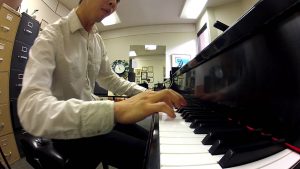Découvrez la vidéo Extreme Hypothetical: Chopin Nocturne As Video Game Music de Video Game Pianist sur Le Fil YouTube de Piano Partage.
Extreme hypothetical: Imagine Chopin Nocturne in B-flat Minor, Op. 9 No. 1 was video game music, and was performed by a 16-bit machine, for example. The machine plays the music strictly at quarter-note = 116 without any rubato whatsoever. The music is heard millions of times in a hypothetical video game that is really popular. As a result, people get used to hearing the machine performance at quarter-note = 116 and without any use of rubato.
Fast forward at least a few months later, and after people have gotten used to listening to the machine play the music without any rubato, when humans begin to perform the music played by the 16-bit machine. Will these performances, performed by highly reputable and revered classically-trained pianists, be convincing to those in the video game music world and perhaps, to a broader spectrum, without being derogatory in any way, to those who often listen to electronic music without any rubato, especially with the human performances having a lot of rubato, and a free choice of tempo, with often a slower performance than quarter-note = 116? This is an important question, because, it seems, that some people become used to listening to music without any rubato. When those people listen to that music with rubato, it may seem to be disconcerting.
For example, over the course of me posting videos on YouTube of me playing video game music where the original source audio does not use rubato, I have received the following comments, as quoted verbatim or to the similar extent of:
"Listen to it at .75x speed for the correct tempo," "1.5x speed for original tempo," "Drives me nuts how he will just randomly slow down, keep up the tempo buddy" "The tempo was a little too fast ...but otherwise quite accurate," "His tempo is all over the place. Makes it sound weird...," "...the thing that bugged me was that the tempo felt slightly off..." "Did a great job but tbh the tempo was all over the place. J.K. Simmons would definitely have chucked a chair at your head [in apparent reference to a scene in the movie Whiplash (2014)]" ..."If I would give one bit of criticism, your tempo is all over the place. I'm unsure of whether this is intentional or not but it sounds like you're messing up.," "can you not follow a tempo? it sounds terrible going fast and slow all the time," "Oh my GOD this is so hard to listen to. Yeah right notes for the most part, but the inconsistency in tempo is so bad,"
"You really seem to have trouble with the tempo and hitting the notes at the right time in most of your tracks," "Try keeping a tempo next time," "The tempo could not possibly be more all over the place." Many more comments have been made on my YouTube channel in this similar fashion.
It seems that in the above comments, other musical aspects, such as tone, creativity, imagination, interpretation, choice of music, or the emotional aspect, and more, is all ignored, with only focus on tempo. It seems as if the change of tempo and/or the choice of tempo in the human performance detracts from the performance, because such tempo fluctuations do not exist as much, if any, in the original source music played by a machine. To be honest, nature of some of the above comments have been somewhat traumatizing, to say the least.
In the classical music world, on different occasions, I've had several highly reputable and very experienced teachers tell me something to the extent of, "Nobody in the audience is going to have a metronome out and check if you are playing with the metronome. Rather people will be listening to structural unity, long musical lines, what you are saying with the music." Another teacher told me not to plan what tempo I would play the Chromatic Fantasy in J.S. Bach's Chromatic Fantasy and Fugue in D Minor, BWV 903. External factors, such as the acoustics of a hall, and the number of people in a hall, would have an effect on the tempo I would play the piece.
One of my mission statements is to bridge the classical music world with the video game music world, and I hope with an open discussion on this topic of rubato and tempo choice, a bridge can continue to be built.
Timestamps:
0:00 Sibelius Ultimate playthrough
0:11 Claudio Arrau
0:24 Vladimir Ashkenazy
0:39 Dang Thai Son
0:53 Andrei Gavrilov
1:12 Maurizio Pollini
1:23 Sviatoslav Richter
1:37 Arthur Rubinstein
1:49 Jean-Yves Thibaudet
2:02 Yundi Li
No copyright infringement intended.
#ClassicalMusic #Chopin #piano






![To Rubato, or Not to Rubato, That is the Question – Chopin Nocturne in B-flat Minor, Op. 9 No. 1 [Video Game Pianist]](https://www.piano-partage.fr/wp-content/uploads/2020/09/C2-AUJel7Y0-150x84.jpg)
